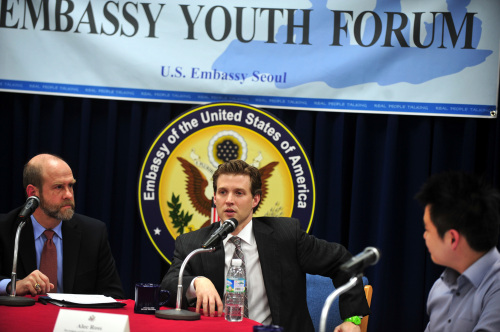Hillary Clinton’s senior technology adviser has promoted Internet freedom on a visit to Korea, saying that governments cannot and should not control information online.
But the U.S. Secretary of State’s senior adviser for innovation, Alec Ross, also said that he saw the WikiLeaks scandal as a theft of intellectual property.
Ross told a youth forum in Seoul that human rights, freedom of speech, a free press and the freedom of association and assembly must also apply online.
”Today, that is where the press is publishing and today that is where people are organizing themselves, so what we have done is put in place a really aggressive Internet freedom agenda,” he said.
“You can look to your neighbors in the North to see one of the worst examples of Internet freedom in the world then look at Seoul, which has one of the most digitally sophisticated environments in the world.”
But Ross said that the case of U.S. Army Private Bradley Manning, who is awaiting trail on charges related to the biggest leak of classified information in U.S. history, was not an act of free speech.
Manning allegedly downloaded and sent tens of thousands of diplomatic cables and documents to anti-secrecy website WikiLeaks, where they were then published online.
“Because there is still necessary secrecy in government, we are still entitled to have confidential communications,” Ross said. “Among the many problems with WikiLeaks in our eyes was that it compromised what were necessarily confidential communications.”

Innovation and technology adviser to Hillary Clinton, Alec Ross, speaks at a youth forum in Seoul. (U.S. embassy)
He said that the U.S. government saw WikiLeaks not as an act of free speech but an act of theft of intellectual property for mass distribution.
“We believe in free speech but we don’t believe in libel or slander,” he added.
Ross, who has also advised President Barack Obama on technology, wants to better connect the governing to the governed, but said full transparency could not apply universally.
“There are still necessary secrets there is still necessary quiet confidential backroom diplomacy, it is still very necessary but that shouldn’t be 100 percent. That shouldn’t be all of diplomacy, so what we are trying to do is open it up a little bit.”
Especially in countries where information is closed, the U.S. government can use the Internet to subvert regimes.
“In a lot of countries, in dictatorships where the dictator is working against the interests of its citizens and where newspapers and television are simply not going to report the truth, we will use social media as a way to directly communicate with foreign publics directly communicating with foreign citizens if government-to-government communication is not effective and if working with the mainstream media is only going to produce inaccurate media,” he said. “This is a little controversial but it is consistent with our values and consistent with our goals. What we are trying to do is to open up diplomacy a little.”
The advisor tasked with using technology to help achieve America’s diplomatic goals criticized those who tried to restrict Internet freedoms.
“The 21st century is a lousy time to be a control freak because government cannot and should not control a hyper-connected environment. And governments that seek to control that are going to fail,” he said.
Although the Chinese government has wiped mention of him from its Internet ― reducing 3 million hits for his name on Chinese search engines to nil in the past year ― he said that governments could not censor people’s mass communications on issues that matter to them.
“The Chinese government decided that it was in their interest to wipe me off the Chinese Internet,” he said. “They could do this because they spend billions of dollars and employ tens of thousands of people to be censors on the Internet. You can do that, you can take me and you can take Ai Weiwei, you can take individuals because you are willing to spend so much money and so much technical sophistication and you can wipe them off the Internet. But what you can’t do is wipe out networks of citizens.”
Ross also spoke to ambassadors at The Korea Foundation on technology and the age of global power as well as speaking to Korean diplomats during his visit to Seoul last week.
During his visit, he advocated that networks of citizens are increasingly empowered over hierarchies and governments, saying that every person with a cell phone now had the equivalent of a printing press and the means to communicate with tens of thousands of people with just one tweet.
By Kirsty Taylor (kirstyt@heraldcorp.com)

![[Herald Interview] 'Amid aging population, Korea to invite more young professionals from overseas'](http://res.heraldm.com/phpwas/restmb_idxmake.php?idx=645&simg=/content/image/2024/04/24/20240424050844_0.jpg&u=20240424200058)




